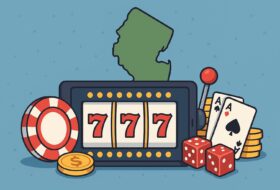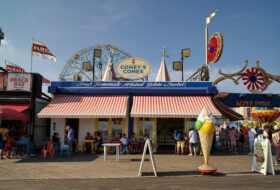
The Stardust Casino brand is back for New Jersey online gamblers, but it’s a somewhat different product than it was to start the year. The new Stardust is under the full control of the brand’s owner, Boyd Gaming, while its former online casino partner FanDuel is out of the picture. At the same time, Pala Casino no longer exists as a real-money gambling brand. Its former users, accounts, and balances have all moved to the new Stardust.
What about Stardust customers from before the change? They all got moved to FanDuel Casino on May 2, the same day Boyd relaunched its brand.
All of these changes, which Boyd announced in February, have come about because of Boyd’s desire to get into the online gambling business directly. It did so by acquiring Pala Interactive for $170 million in November 2022. Now fully integrated as a division of Boyd, that formerly independent company now goes by Boyd Interactive.
That, of course, explains why Boyd relaunched the brand by renaming the existing Pala Casino. The latter has never held much market share, so there’s no point for the company to operate two brands. Former Pala users now have to use the Stardust app, but their login credentials are the same, and their account balances have been migrated. As a bonus, they’re now automatically enrolled in the Boyd Rewards program, which Stardust shares with Boyd’s retail properties.
Stardust Casino was also available in Pennsylvania. As in New Jersey, players have been moved to FanDuel Casino. Boyd hasn’t yet relaunched Stardust there, as there’s no Pala Casino product to rebrand. It plans to bring Stardust back to the Keystone State, but the company’s media contact did not respond to inquiries about a possible timeline.
The Boyd-FanDuel Relationship
Despite parting ways on the Stardust Casino project, Boyd still has a business relationship with FanDuel. The two are partners in sports betting, and Boyd owns a 5% stake in FanDuel. Retail sportsbooks at many Boyd casino properties use FanDuel branding.
The original Stardust Casino was an “old Vegas” institution. Boyd closed the property on short notice in 2006 and demolished the buildings the following year. However, the name still has cachet, which is why Boyd wanted to bring it back as an online casino brand.
At the time, in 2021, it lacked the capacity to launch an online product of its own. Teaming up FanDuel made sense because of the existing relationship between the two companies. For FanDuel, it was a way of going after traditional casino users. Although FanDuel is a big name in the online casino space, it and other sports-first companies like DraftKings have found that there’s a difference between sports bettors who visit the casino and pure-play casino users.
However, online casinos are a lucrative business, so it’s no wonder Boyd eventually decided it wanted to fly solo. Pala had the software but not the user base, making it an appealing and affordable acquisition target.
As for FanDuel, it may want to begin exploring options to replace the Stardust brand. After all, the standalone casino as a secondary brand is an idea its biggest competitors have all adopted as well:
- DraftKings acquired Golden Nugget Online Gaming
- BetMGM launched a standalone Wheel of Fortune Casino
- Caesars has announced plans to launch a standalone casino product in New Jersey later this year
Business Deals Have Made the NJ Market Confusing
The old Stardust Casino was itself a rebranding of Betfair Casino. FanDuel had originally teamed up with Betfair to offer online casino gaming because it obtained its sports betting market access through Meadowlands Racetrack. As a racetrack and not a casino, Meadowlands doesn’t have an iGaming license. Betfair provided a natural partner for FanDuel because both are owned by the international conglomerate Flutter.
So, one-time Betfair Casino players became Stardust players who finally got folded into FanDuel. Meanwhile, Pala players are now Stardust players. It’s all a little confusing, but that shifting and combining of brands is becoming par for the course in New Jersey. As the longest-standing online casino market in the US, it predates the whirlwind of business deals that marked the early years of legal sports betting.
Another, even more confusing example is what’s happened with Caesars. Its original online casino now uses the Tropicana brand but operates on the license held by Harrah’s, another Caesars property. Meanwhile, the new Caesars Sportsbook & Casino – which used to be William Hill – operates on the license tied to Tropicana’s retail property. To compound the chaos, the new casino-only Caesars Palace product is also arriving in the fall.
Fortunately, these companies try to make the transitions as seamless as possible for their players. The confusion exists mainly for those trying to keep track of the business and regulatory sides of things.





